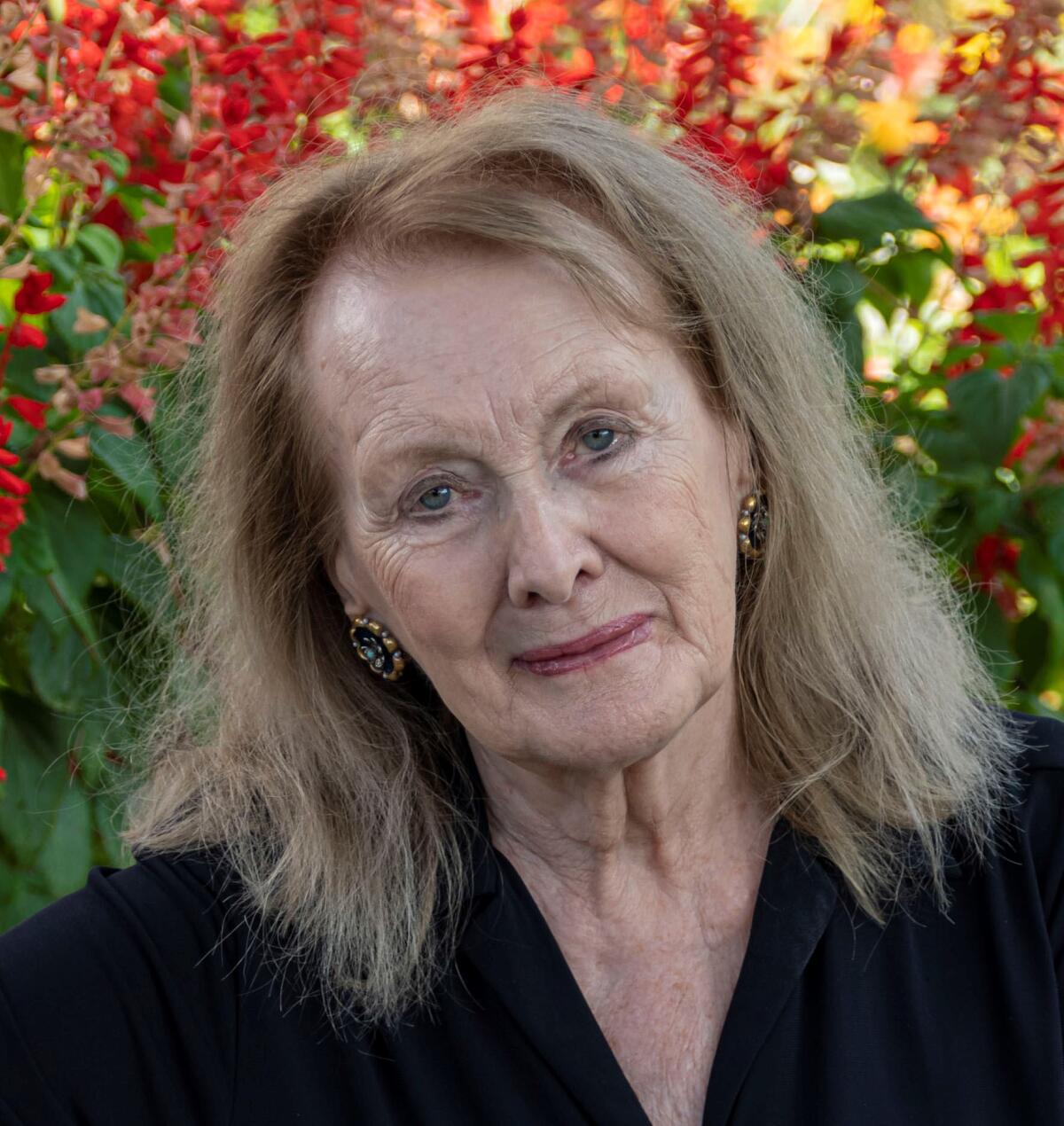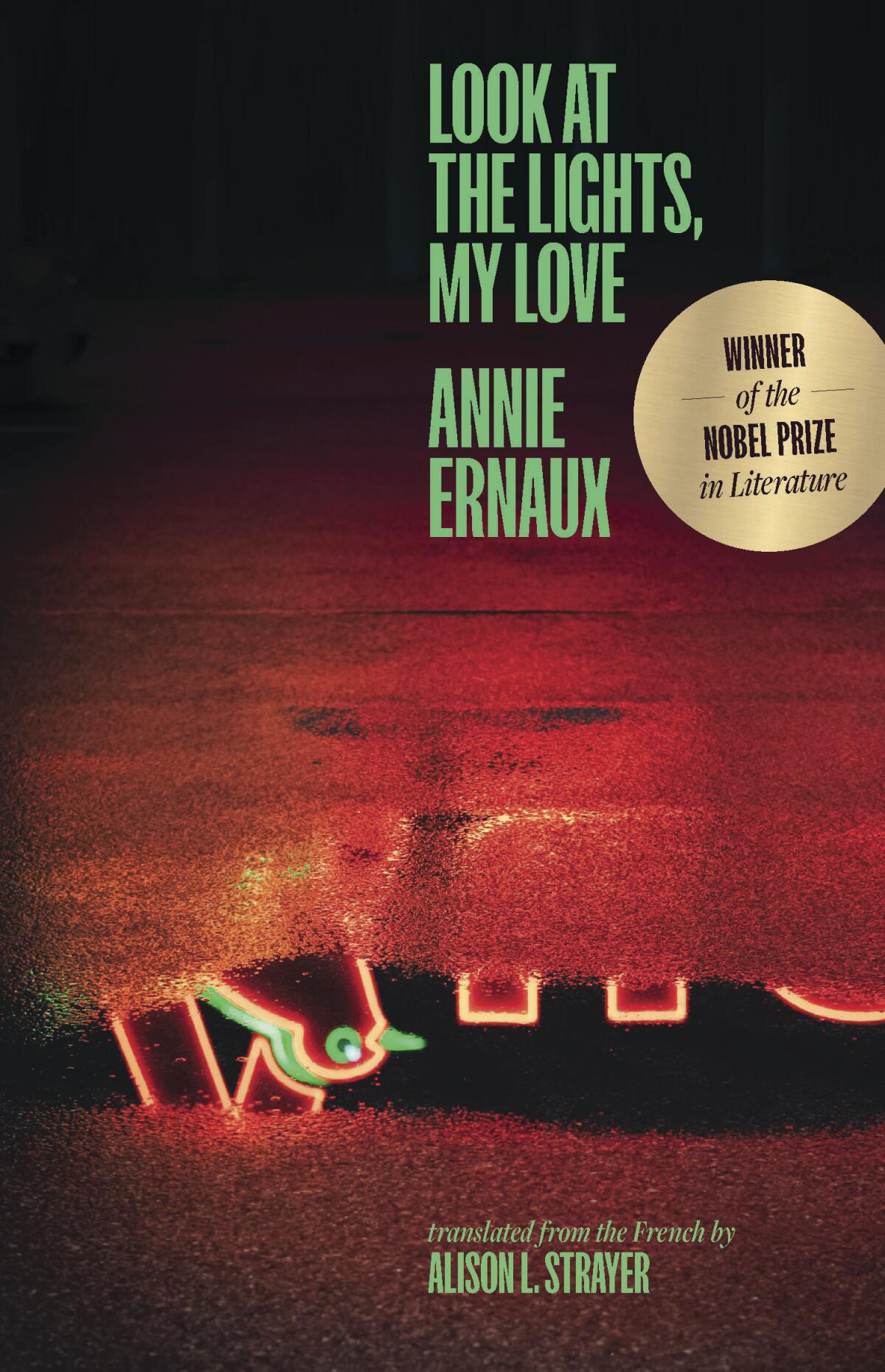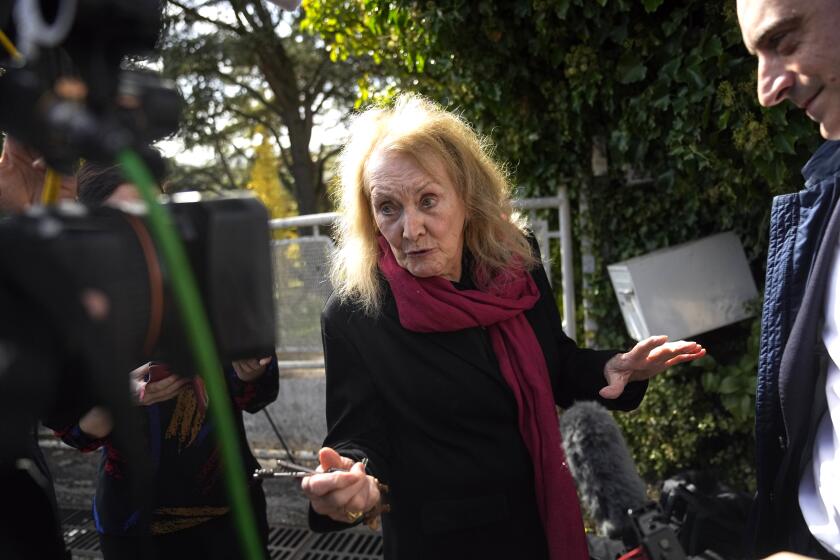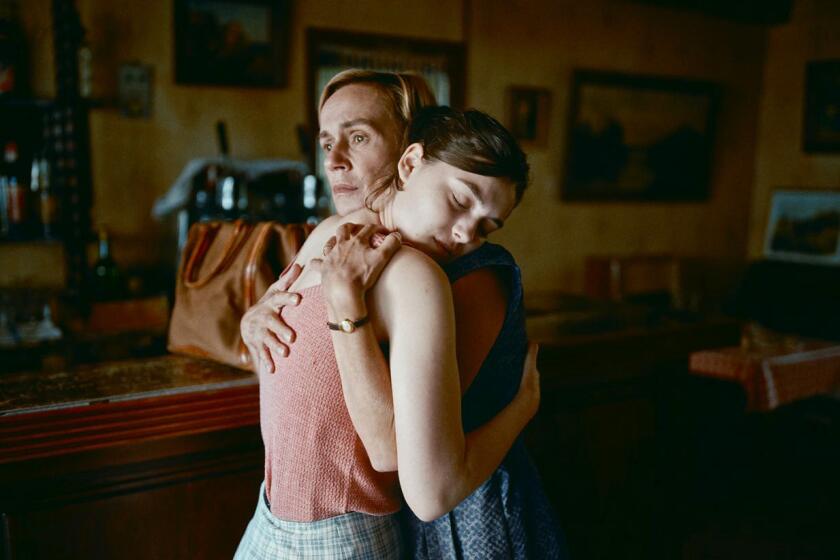A Nobel Prize-winning French author looks at a shopping mall. Magic ensues

- Share via
Review
Look at the Lights, My Love
By Annie Ernaux
Translated by Alison L. Strayer
Yale: 96 page, $16
If you buy books linked on our site, The Times may earn a commission from Bookshop.org, whose fees support independent bookstores.
“We choose our objects and our places of memory,” Annie Ernaux writes near the start of “Look at the Lights, My Love,” “or rather the spirit of the times decides what is worth remembering.” It’s a statement that could apply to her whole career. Ernaux, who won the Nobel Prize in Literature last October, has long been a writer who occupies the middle ground between experience and recollection, between the life that is lived and the one that is recalled.
At times, as in her astonishing pair of parental portraits, “A Man’s Place” and “A Woman’s Story,” this can seem close to the territory of elegy. Ernaux, however, has nothing so sentimental in mind. “This neutral way of writing,” she describes her approach in the first of those two books, as if she were a kind of anthropologist, sifting through the detritus of her own existence in search of a meaning only she can distill.
“Look at the Lights, My Love” turns a similar sort of attention toward the Trois-Fontaines shopping center, a Parisian big-box superstore. Originally published in France in 2013 and newly translated into English by Alison L. Strayer, the book is, Ernaux informs us, “not a systematic investigation or exploration but a journal, the form most in keeping with my temperament.”
Yes, awarding the Nobel Prize in literature to Ernaux, a chronicler of illegal abortion, is a political move. But it’s also a victory for literature
If such a project might appear anomalous coming from a writer given to internal excavation, it is also rooted in her work. I am reminded of Ernaux’s 1993 book “Exteriors,” which also functions as a journal of sorts: a series of notes, aphorisms and brief bits of description that together comprise a fragmentary accounting of minor moments and half-articulated interactions in the author’s Paris suburb. “I have this need,” she admits in those pages, “to record … people’s words and gestures simply for their own sake, without any ulterior motive.” But is this all it is? More to the point, it reflects the central tension in her writing, between neutrality and subjectivity — the seen and the felt.

Ernaux is aware of this; as she confides in “Exteriors,” “I have put a lot of myself into these texts, far more than I originally planned.” Something similar might be said of “Look at the Lights, My Love,” which echoes a number of her earlier narratives, from its reflections on abortion — reminiscent of “Cleaned Out” and “Happening” — to observations about class and custom rooted in the author’s upbringing as the daughter of shopkeepers in the Norman village of Yvetot.
“The less money one has,” she tells us, “the more carefully one must shop, making no mistakes. More time is needed. A list must be made. … This is a form of economic labor, uncounted and obsessive, that fully occupies thousands of women and men. The beginning of wealth, of the levity of wealth, is discernible in the act of taking an item from a shelf of food without first checking the price.”
Ernaux is writing as both watcher and participant; she has lived on both ends of that divide. Raised working class, she entered the middle class through education at the exact moment postwar prosperity took hold. In her 2008 reminiscence “The Years,” she recalls the thrill of discovering Kate Millet and Germaine Greer, of finding herself in the world of ideas.
Annie Ernaux is ruthless. I mean that as a compliment.
At the same time, where did that world of ideas leave her? In the complicated middle again. Contemporary culture, “Look at the Lights, My Love” insists, makes it impossible not to be a consumer. And to be a consumer is to be complicit, in Ernaux’s view. On April 24, she reports, “An eight-story building collapsed near Dhaka, Bangladesh. At least two hundred are thought to have died. Three thousand workers were employed in garment workshops there for Western brand names. To specify ‘Western’ has long been redundant.” Three weeks later, she offers an update: “The death count from the collapse of Rana Plaza in Bangladesh is 1,127. Found in the rubble were brand labels for Carrefour, Camaïeu, and Auchan.”
On the one hand, that’s an almost perfectly understated piece of writing, a brilliant encapsulation of Ernaux’s particular minimalism at work. There’s not a wasted word in that short passage, which is damning because of both what it specifies and what it leads us to infer. On the other, it returns us to the question of neutrality, which is both essential to the author’s intentions and necessarily unresolved.
“As I do every time I cease to record the present,” Ernaux acknowledges in the book’s closing entry, “I feel I am withdrawing from the movement of the world, giving up not only narrating my days, but seeing them too. Because seeing in order to write is to see in a different way. It means to distinguish objects, individuals, and mechanisms, and to give their existence value.”
A new film adaptation of a 2000 memoir, “Happening,” about a French woman’s illegal 1963 abortion, trades the book’s specifity for universal power.
For Ernaux, this is a matter of both personal and political engagement, and it reverberates, as does so much of her writing, back to her childhood in Yvetot. Still, if it’s impossible, reading this book, not to think about her parents’ grocery/café, Ernaux eschews any easy judgment in favor of a more subtle reckoning.
“It may be,” she concludes, “that this life will disappear with the proliferation of individualist sales schemes such as online ordering and curbside pickup, apparently gaining ground each day among the middle and upper classes. So today’s children, in adulthood, may remember with nostalgia Saturday shopping at the Hyper U, as those of over fifty remember the pungent grocers’ shops of the past where they went with a metal pitcher to get fresh milk.”
Each moment, in other words, exists independently and on its own terms, which means that even a suburban superstore, that late capitalist monument to consumption, is likely to be recalled one day through a more human lens.
Ulin is a former book editor and book critic of the Times.
More to Read
Sign up for our Book Club newsletter
Get the latest news, events and more from the Los Angeles Times Book Club, and help us get L.A. reading and talking.
You may occasionally receive promotional content from the Los Angeles Times.









